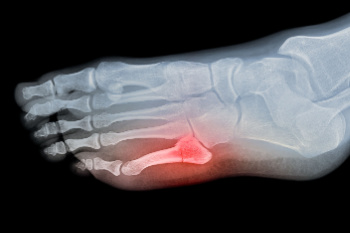July 2024
Do Your Child's Feet Hurt?
A Step-by-Step Approach for Foot Wound Care

Caring for foot wounds involves a systematic approach to promote healing and prevent complications. Start by cleaning the wound gently with mild soap and lukewarm water, avoiding harsh scrubbing to prevent further damage. Rinse thoroughly and pat dry with a clean, soft cloth. Apply an antibiotic ointment to protect against infection and cover the wound with a sterile dressing or bandage. Change dressings daily or as instructed by a podiatrist to keep the wound clean and monitor healing progress. Elevate the injured foot when possible to reduce swelling and improve blood flow. Avoid putting weight on the wound and wear appropriate footwear to minimize pressure and friction. Additionally, regularly inspect the wound for signs of infection such as increased pain, redness, or pus, and seek prompt medical attention from a podiatrist if these symptoms occur. If you have developed a wound on your foot, it is strongly suggested that you schedule an appointment with this type of doctor.
Wound care is an important part in dealing with diabetes. If you have diabetes and a foot wound or would like more information about wound care for diabetics, consult with one of our podiatrists from Bazzi Podiatry. Our doctors will assess your condition and provide you with quality foot and ankle treatment.
What Is Wound Care?
Wound care is the practice of taking proper care of a wound. This can range from the smallest to the largest of wounds. While everyone can benefit from proper wound care, it is much more important for diabetics. Diabetics often suffer from poor blood circulation which causes wounds to heal much slower than they would in a non-diabetic.
What Is the Importance of Wound Care?
While it may not seem apparent with small ulcers on the foot, for diabetics, any size ulcer can become infected. Diabetics often also suffer from neuropathy, or nerve loss. This means they might not even feel when they have an ulcer on their foot. If the wound becomes severely infected, amputation may be necessary. Therefore, it is of the upmost importance to properly care for any and all foot wounds.
How to Care for Wounds
The best way to care for foot wounds is to prevent them. For diabetics, this means daily inspections of the feet for any signs of abnormalities or ulcers. It is also recommended to see a podiatrist several times a year for a foot inspection. If you do have an ulcer, run the wound under water to clear dirt from the wound; then apply antibiotic ointment to the wound and cover with a bandage. Bandages should be changed daily and keeping pressure off the wound is smart. It is advised to see a podiatrist, who can keep an eye on it.
If you have any questions, please feel free to contact one of our offices located in Detroit, West Detroit, Northwest Detroit, Sterling Heights, Hamtramck, Dearborn Heights, Madison Heights, Redford, and Livonia, MI . We offer the newest diagnostic and treatment technologies for all your foot care needs.
Causes and Relief From Plantar Fasciitis

Plantar fasciitis is a common condition characterized by inflammation of the plantar fascia, a thick band of tissue that runs along the bottom of the foot. Symptoms often include sharp heel pain, especially in the morning or after long periods of rest. Causes of plantar fasciitis can vary, with overpronation, where the foot rolls inward excessively, being a significant factor. Additionally, differences in leg length can contribute to uneven stress on the feet. Relief options are available, including stretching exercises, orthotic supports, and proper footwear. Using anti-inflammatory medications can also help alleviate pain. If you have heel pain, it is strongly suggested that you consult a podiatrist who can successfully treat plantar fasciitis.
Plantar fasciitis can be very painful and inconvenient. If you are experiencing heel pain or symptoms of plantar fasciitis, contact one of our podiatrists from Bazzi Podiatry. Our doctors can provide the care you need to keep you pain-free and on your feet.
What Is Plantar Fasciitis?
Plantar fasciitis is the inflammation of the thick band of tissue that runs along the bottom of your foot, known as the plantar fascia, and causes mild to severe heel pain.
What Causes Plantar Fasciitis?
- Excessive running
- Non-supportive shoes
- Overpronation
- Repeated stretching and tearing of the plantar fascia
How Can It Be Treated?
- Conservative measures – anti-inflammatories, ice packs, stretching exercises, physical therapy, orthotic devices
- Shockwave therapy – sound waves are sent to the affected area to facilitate healing and are usually used for chronic cases of plantar fasciitis
- Surgery – usually only used as a last resort when all else fails. The plantar fascia can be surgically detached from the heel
While very treatable, plantar fasciitis is definitely not something that should be ignored. Especially in severe cases, speaking to your doctor right away is highly recommended to avoid complications and severe heel pain. Your podiatrist can work with you to provide the appropriate treatment options tailored to your condition.
If you have any questions please feel free to contact one of our offices located in Detroit, West Detroit, Northwest Detroit, Sterling Heights, Hamtramck, Dearborn Heights, Madison Heights, Redford, and Livonia, MI . We offer the newest diagnostic and treatment technologies for all your foot and ankle needs.
How Does Multiple Sclerosis Affect Foot Health?

Multiple sclerosis, or MS, can significantly impact foot health due to its effects on the nervous system, leading to various symptoms. Common foot issues can include numbness or tingling, muscle weakness, and difficulty with balance and coordination. These symptoms can contribute to challenges in walking, increased risk of falls, and potential development of foot deformities like claw toes or foot drop. Managing MS-related foot issues involves a multidisciplinary approach, with visiting a podiatrist as an essential part. Podiatrists can assess foot function, and recommend appropriate footwear to improve stability and reduce pressure points. Regular podiatric care helps individuals with MS maintain optimal foot health, minimizing discomfort and improving mobility. If you have multiple sclerosis, it is suggested you visit a podiatrist who can help you manage this condition as it affects your feet.
Some foot conditions may require additional professional care. If you have any concerns, contact one of our podiatrists of Bazzi Podiatry. Our doctors can provide the care you need to keep you pain-free and on your feet.
Rare Foot Conditions
The majority of foot conditions are common and can be treated by a podiatrist. Standard diagnostic procedures are generally used to identify specific conditions and treatment can be rendered. A podiatrist also treats rare foot conditions which can be difficult to diagnose and may need extra attention and care.
There are many rare foot conditions that can affect children. Some of these can include:
- Freiberg’s disease
- Kohler’s disease
- Maffucci syndrome
Freiberg’s disease - This can be seen as a deterioration and flattening of a metatarsal bone that exists in the ball of the foot. It typically affects pre-teen and teenage girls, but can affect anyone at any age. Symptoms that can accompany this can be swelling, stiffness, and the patient may limp.
Kohler’s disease - This often targets the bone in the arch of the foot and affects younger boys. It can lead to an interruption of the blood supply which ultimately can lead to bone deterioration. The patient may limp or experience tenderness, swelling, and redness.
Maffucci syndrome - This affects the long bones in a child’s foot leading to the development of abnormal bone lesions. They are benign growths and typically develop in early childhood and the bones may be susceptible to breaking.
A podiatrist can properly diagnose and treat all types of rare foot conditions. If your child is affected by any of these symptoms or conditions, please don’t hesitate to call our office so the correct treatment method can begin.
If you have any questions please feel free to contact one of our offices located in Detroit, West Detroit, Northwest Detroit, Sterling Heights, Hamtramck, Dearborn Heights, Madison Heights, Redford, and Livonia, MI . We offer the newest diagnostic tools and technology to treat your foot and ankle needs.
Gout and Bunion Confusion
 Gout and bunions are distinct foot conditions that can sometimes be confused due to similar symptoms of pain and swelling in the big toe area. Gout is a form of inflammatory arthritis caused by the accumulation of uric acid crystals in the joint, leading to sudden, severe pain, redness, and swelling. It often affects the big toe but can occur in other joints. Bunions are structural deformities where the big toe deviates toward the other toes, causing a bony bump on the side of the foot. This can result from wearing tight shoes, genetic factors, or arthritis. Bunions can cause chronic pain, especially while walking or wearing shoes, and can lead to swelling and redness. To manage gout, lifestyle changes such as reducing alcohol and purine-rich foods, staying hydrated, and taking medications to lower uric acid levels are recommended. Bunions may be managed with properly fitting shoes, orthotics, and, in severe cases, surgery. If you have toe pain, it is suggested that you schedule an appointment with a podiatrist for an accurate diagnosis and appropriate treatment plan for either condition.
Gout and bunions are distinct foot conditions that can sometimes be confused due to similar symptoms of pain and swelling in the big toe area. Gout is a form of inflammatory arthritis caused by the accumulation of uric acid crystals in the joint, leading to sudden, severe pain, redness, and swelling. It often affects the big toe but can occur in other joints. Bunions are structural deformities where the big toe deviates toward the other toes, causing a bony bump on the side of the foot. This can result from wearing tight shoes, genetic factors, or arthritis. Bunions can cause chronic pain, especially while walking or wearing shoes, and can lead to swelling and redness. To manage gout, lifestyle changes such as reducing alcohol and purine-rich foods, staying hydrated, and taking medications to lower uric acid levels are recommended. Bunions may be managed with properly fitting shoes, orthotics, and, in severe cases, surgery. If you have toe pain, it is suggested that you schedule an appointment with a podiatrist for an accurate diagnosis and appropriate treatment plan for either condition.
Gout is a painful condition that can be treated. If you are seeking treatment, contact one of our podiatrists from Bazzi Podiatry. Our doctors will treat your foot and ankle needs.
What Is Gout?
Gout is a form of arthritis that is characterized by sudden, severe attacks of pain, redness, and tenderness in the joints. The condition usually affects the joint at the base of the big toe. A gout attack can occur at any random time, such as the middle of the night while you are asleep.
Symptoms
- Intense Joint Pain - Usually around the large joint of your big toe, and it most severe within the first four to twelve hours
- Lingering Discomfort - Joint discomfort may last from a few days to a few weeks
- Inflammation and Redness -Affected joints may become swollen, tender, warm and red
- Limited Range of Motion - May experience a decrease in joint mobility
Risk Factors
- Genetics - If family members have gout, you’re more likely to have it
- Medications - Diuretic medications can raise uric acid levels
- Gender/Age - Gout is more common in men until the age of 60. It is believed that estrogen protects women until that point
- Diet - Eating red meat and shellfish increases your risk
- Alcohol - Having more than two alcoholic drinks per day increases your risk
- Obesity - Obese people are at a higher risk for gout
Prior to visiting your podiatrist to receive treatment for gout, there are a few things you should do beforehand. If you have gout you should write down your symptoms--including when they started and how often you experience them, important medical information you may have, and any questions you may have. Writing down these three things will help your podiatrist in assessing your specific situation so that he or she may provide the best route of treatment for you.
If you have any questions, please feel free to contact one of our offices located in Detroit, West Detroit, Northwest Detroit, Sterling Heights, Hamtramck, Dearborn Heights, Madison Heights, Redford, and Livonia, MI . We offer the newest diagnostic and treatment technologies for all your foot care needs.
Recognizing Common Symptoms of a Broken Foot

A broken foot can present with several clear symptoms, and it is vital to identify them for prompt treatment. One of the most telling signs is a sharp, severe pain that often worsens with movement or weight-bearing activities. A sensation of dislocated bones, where the foot feels misaligned or abnormal, is also common. Swelling and bruising typically develop rapidly around the affected area, indicating internal bleeding and inflammation. Visible deformities or an inability to move the foot or toes may also occur, in addition to a pronounced tenderness when touching the injured area. Treatment may include immobilization with a cast, use of crutches, and in severe cases, surgical intervention to realign the broken bones. If you feel you may have broken your foot, it is suggested that you consult a podiatrist who can accurately diagnose it and treat it accordingly.
A broken foot requires immediate medical attention and treatment. If you need your feet checked, contact one of our podiatrists from Bazzi Podiatry. Our doctors can provide the care you need to keep you pain-free and on your feet.
Broken Foot Causes, Symptoms, and Treatment
A broken foot is caused by one of the bones in the foot typically breaking when bended, crushed, or stretched beyond its natural capabilities. Usually the location of the fracture indicates how the break occurred, whether it was through an object, fall, or any other type of injury.
Common Symptoms of Broken Feet:
- Bruising
- Pain
- Redness
- Swelling
- Blue in color
- Numbness
- Cold
- Misshapen
- Cuts
- Deformities
Those that suspect they have a broken foot shoot seek urgent medical attention where a medical professional could diagnose the severity.
Treatment for broken bones varies depending on the cause, severity and location. Some will require the use of splints, casts or crutches while others could even involve surgery to repair the broken bones. Personal care includes the use of ice and keeping the foot stabilized and elevated.
If you have any questions please feel free to contact one of our offices located in Detroit, West Detroit, Northwest Detroit, Sterling Heights, Hamtramck, Dearborn Heights, Madison Heights, Redford, and Livonia, MI . We offer the newest diagnostic and treatment technologies for all your foot and ankle needs.





